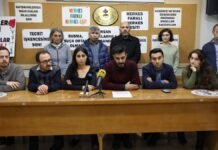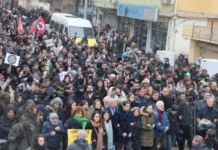Turkish courts have ruled for the arrest of 20 social media users due to their “provocative” posts on social media about a powerful earthquake that hit the country’s south on Feb. 6, Turkish Minute reported, citing a statement from the Security Directorate General.
The directorate said in a statement on Wednesday that out of 293 social media users who have been investigated so far, 78 have been detained and 10 arrested for sharing “provocative” posts about the earthquake in order to “create fear and panic in the society.”
Turkey’s most powerful earthquake in almost 100 years struck near the city of Gaziantep, which is home to around 2 million people and on the border with Syria, killing nearly 40,000 people in Turkey and neighboring Syria as of Wednesday.
The 7.8-magnitude earthquake, which struck as people were still sleeping, was followed by dozens of aftershocks, including a 7.5-magnitude temblor that jolted the region in the middle of search and rescue operations the same day.
Only one day after the powerful earthquakes, Turkey’s Presidential Communications Director Fahrettin Altun announced the introduction of an app that combats the spread of online “disinformation.”
The “Disinformation Reporting Service” app was made available for download on both iOS and Android devices last Tuesday, which led to comments that the government was busy hunting down social media users at a time when people were waiting to be rescued under the rubble of thousands of flattened buildings.
“You can download our app to your phone and report the news produced and spread about the earthquake disaster that you think is suspicious/fake,” Altun said.
The app was launched after opposition politicians, journalists and human rights activists who have been reporting on the latest situation, mostly from regions affected by the earthquake, accused the ruling Justice and Development Party (AKP) of poor performance in coordinating search and rescue efforts after the massive quakes.
The government is mainly accused of failing to mobilize enough people for the efforts and a lack of coordination among the teams, which resulted in civilians in some regions trying to pull their loved ones from under the rubble themselves and finding them frozen to death although they sustained no critical injuries in the collapse.
Many social media users also complained about the lack of basic necessities, such as water, blankets and tents as well as medical supplies.
Turkish authorities have in the last few years cracked down on social media posts, especially those considered to support “terrorism,” but this has led to accusations that freedom of expression has been curtailed.















